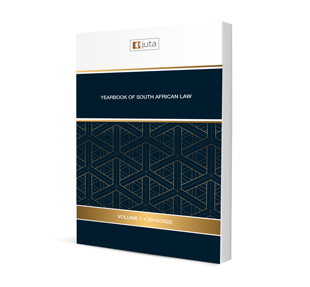Sentencing

Sentencing
Author Andra Le Roux-Kemp
ISSN: 2710-0677
Affiliations: Associate Professor, University of Lincoln (UK)
Source: Yearbook of South African Law, Volume 1, p. 1136-1178
https://doi.org/10.47348/YSAL/v1/i1a21

ISSN: 2710-0677
Affiliations: Associate Professor, University of Lincoln (UK)
Source: Yearbook of South African Law, Volume 1, p. 1136-1178
https://doi.org/10.47348/YSAL/v1/i1a21

ISSN: 2710-0677
Affiliations: BA LLB (Cape) LLM (London) H Dip Tax (Wits) PhD (Macquarie), Professor Emeritus in the School of Law, University of KwaZulu-Natal, Pietermaritzburg.
Source: Yearbook of South African Law, Volume 1, p. 1179-1207
https://doi.org/10.47348/YSAL/v1/i1a25

ISSN: 2411-7870
Affiliations: Lecturer in Scottish Private Law, University of Strathclyde
Source: Fundamina, Volume 26 Issue 1, p. 1-41
https://doi.org/10.47348/FUND/v26/i1a1
No physician who performs a legitimate medical operation on a patient commits a criminal offence or a delict. This is so in spite of the fact that infringement of the bodily integrity of another person is seen as both a crime and a civil wrong. Notwithstanding the fact that the patient may desire the operation, the defence of consent cannot possibly justify the serious injuries intentionally inflicted in the course of, say, an amputation, since this procedure is highly invasive and effects irreversible changes to the patient’s physicality. The so-called medical exception is consequently invoked to preclude prosecution of medical practitioners who carry out procedures that involve serious wounding. Quite where the justification for the medical exception lies, remains controversial. The exception has long been justified axiomatically – by reference to the existence of surgery as a profession – or has otherwise been held to be sui generis. Herein, however, it is submitted that its basis in Scots jurisprudence can be found through consideration of the etymology of the word “injury” as applied as a term of art in Scots law. At its core, the crime/delict of “injury” is connected to the Roman notion of iniuria, which served to preserve and uphold the boni mores – good morals. Conduct that contumeliously affronted the dignity of a person could clearly be classified as contra bonos mores, but it is apparent that iniuria may be effected even in instances where there could be no subjective affront to the individual person. This, it is submitted, rationalises the medical exception: “Proper medical treatment” is not contra bonos mores and so cannot be said to amount to injury or assault. Hence, the framing of the medical exception as such in Scots law is incorrect. The so-called exception is, rather, a necessary consequence of the conceptual understanding of the terms “assault” and “real injury” in Scottish jurisprudence.

ISSN: 2411-7870
Affiliations: Lecturer, School of Law, University of KwaZulu-Natal
Source: Fundamina, Volume 26 Issue 1, p. 42-90
https://doi.org/10.47348/FUND/v26/i1a2
The attitude of European invaders toward the African people they encountered during the colonial conquest of South Africa has been crucial in the formulation of law. This contribution undertakes a contrapuntal reading of historic laws pertinent to notions of labour and its regulation, in order to reveal the import of its orientation to the system devised. The discourse on Africans and the manner of their utilisation as a source of labour are assessed from the text of legal provisions of the emergent Cape Colony and the later period of industrial mining in the Zuid-Afrikaansche Republiek. From a post-colonial, theoretical perspective, the exploration expands the latitude of labour law to incorporate property, mobility, mining and other subsets of law. A recount of these early laws reveals that the forcible labouring of Africans has been vital in the development of colonial settlements and enterprise endeavours. The supposed worthwhile modernisation of South Africa has been largely accomplished through the cruelty imposed on Africans. Yet normalised accounts advance concrete separations, (white) leadership alongside legitimised African servitude. Fidelity to that paradigm of thought demands an either-or response to historical events (either it was good – a necessary evil – or it was bad), without making room for nuanced deliberation. It presumes a capacity to escape colonial manipulation when interrogating its misdeeds. However, the formation of that type of thought itself is flawed, and has failed to create the certitudes professed. Since the founding mythos upon which legal reasoning has been assembled has rested on the diminution of Africans, continued fidelity to the accumulated arrangements of labour and its control is disturbed by the appraisal in this contribution. The process avoids validating the simplistic legitimation of labour norms by the controlled insertion of Africans into colonised spaces – a narrow way of thinking that encourages the belief that solutions can be found in according Africans access to the spoils of conquest.

ISSN: 2411-7870
Affiliations: BA, LLB, LLM (Natal), PhD (Rhodes), Judge of the Supreme Court of Appeal, Honorary Visiting Professor, Rhodes University. This contribution is based on a lecture presented at the Faculty of Law, Rhodes University, Makhanda on 8 Oct 2019.
Source: Fundamina, Volume 26 Issue 1, p. 91-127
https://doi.org/10.47348/FUND/v26/i1a3
The principal focus of this contribution concerns five cases involving questions of public law, namely the meaning of discrimination; the meaning of public power and its control; whether administrative actions may be reviewed for unreasonableness; the rights of prisoners; and the control of emergency powers in the face of an ouster clause. All five cases were decided in the Appellate Division of the Supreme Court of South Africa, now known as the Supreme Court of Appeal, and all were decided prior to 1994: in 1934, 1958, 1976, 1979 and 1988. In each, a dissenting judgment was delivered that articulated values that we today associate with our present democratic Constitution. Before dealing with those cases in detail, it is necessary to say something about the connection between the pre- and post-1994 law, and then to consider the role of some dissenting judgments in the development of the law.